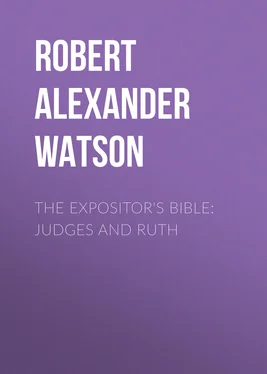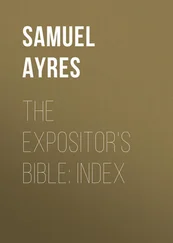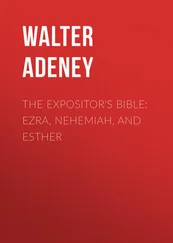Robert Alexander Watson - The Expositor's Bible - Judges and Ruth
Здесь есть возможность читать онлайн «Robert Alexander Watson - The Expositor's Bible - Judges and Ruth» — ознакомительный отрывок электронной книги совершенно бесплатно, а после прочтения отрывка купить полную версию. В некоторых случаях можно слушать аудио, скачать через торрент в формате fb2 и присутствует краткое содержание. Издательство: Иностранный паблик, Жанр: foreign_prose, foreign_religion, Философия, foreign_psychology, foreign_antique, на английском языке. Описание произведения, (предисловие) а так же отзывы посетителей доступны на портале библиотеки ЛибКат.
- Название:The Expositor's Bible: Judges and Ruth
- Автор:
- Издательство:Иностранный паблик
- Жанр:
- Год:неизвестен
- ISBN:нет данных
- Рейтинг книги:5 / 5. Голосов: 1
-
Избранное:Добавить в избранное
- Отзывы:
-
Ваша оценка:
- 100
- 1
- 2
- 3
- 4
- 5
The Expositor's Bible: Judges and Ruth: краткое содержание, описание и аннотация
Предлагаем к чтению аннотацию, описание, краткое содержание или предисловие (зависит от того, что написал сам автор книги «The Expositor's Bible: Judges and Ruth»). Если вы не нашли необходимую информацию о книге — напишите в комментариях, мы постараемся отыскать её.
The Expositor's Bible: Judges and Ruth — читать онлайн ознакомительный отрывок
Ниже представлен текст книги, разбитый по страницам. Система сохранения места последней прочитанной страницы, позволяет с удобством читать онлайн бесплатно книгу «The Expositor's Bible: Judges and Ruth», без необходимости каждый раз заново искать на чём Вы остановились. Поставьте закладку, и сможете в любой момент перейти на страницу, на которой закончили чтение.
Интервал:
Закладка:
Now it is upon Christianity as approving all this that the Moabites and Ammonites of our day are falling. They are frankly worshippers of Chemosh and Milcom, not of Jehovah; they believe in wealth, their all is staked on the earthly prosperity and enjoyment for which they strive. It is too bad, they feel, to have their sphere and hopes curtailed by men who profess no respect for the world, no desire for its glory but a constant preference for things unseen; they writhe when they consider the triumphs wrested from them by rivals who count success an answer to prayer and believe themselves favourites of God. Or the frank heathen finds that in business a man professing Christianity in the customary way is as little cumbered as himself by any disdain of tarnished profits and "smart" devices. What else can be expected but that, driven back and back by the energy of Christians so called, the others shall begin to think Christianity itself largely a pretence? Do we wonder to see the revolution in France hurling its forces not only against wealth and rank, but also against the religion identified with wealth and rank? Do we wonder to see in our day socialism, which girds at great fortunes as an insult to humanity, joining hands with agnosticism and secularism to make assault on the church? It is precisely what might be looked for; nay, more, the opposition will go on till Christian profession is purged of hypocrisy and Christian practice is harmonized with the law of Christ. Not the push, not the equivocal success of one person here and there is it that creates doubt of Christianity and provokes antagonism, but the whole systems of society and business in so-called Christian lands, and even the conduct of affairs within the church, the strain of feeling there. For in the church as without it wealth and rank are important in themselves, and make some important who have little or no other claim to respect. In the church as without it methods are adopted that involve large outlay and a constant need for the support of the wealthy; in the church as without it life depends too much on the abundance of the things that are possessed. And, in the not unfair judgment of those who stand outside, all this proceeds from a secret doubt of Christ's law and authority, which more than excuses their own denial. The strifes of the day, even those that turn on the Godhead of Christ and the inspiration of the Bible, as well as on the divine claim of the church, are not due solely to hatred of truth and the depravity of the human heart. They have more reason than the church has yet confessed. Christianity in its practical and speculative aspects is one; it cannot be a creed unless it is a life. It is essentially a life not conformed to this world, but transformed, redeemed. Our faith will stand secure from all attacks, vindicated as a supernatural revelation and inspiration, when the whole of church life and Christian endeavour shall rise above the earthly and be manifest everywhere as a fervent striving for the spiritual and eternal.
We have been assuming the unfaithfulness of Israel to its duty and vocation. The people of God, instead of commending His faith by their neighbourliness and generosity, were, we fear, too often proud and selfish, seeking their own things not the well-being of others, sending no attractive light into the heathenism around. Moab was akin to the Hebrews and in many respects similar in character. When we come to the Book of Ruth we find a certain intercourse between the two. Ammon, more unsettled and barbarous, was of the same stock. Israel, giving nothing to these peoples, but taking all she could from them, provoked antagonism all the more bitter that they were of kin to her, and they felt no scruple when their opportunity came. Not only had the Israelites to suffer for their failure, but Moab and Ammon also. The wrong beginning of the relations between them was never undone. Moab and Ammon went on worshipping their own gods, enemies of Israel to the last.
Ehud appears a deliverer. He was a Benjamite, a man left-handed; he chose his own method of action, and it was to strike directly at the Moabite king. Eager words regarding the shamefulness of Israel's subjection had perhaps already marked him as a leader, and it may have been with the expectation that he would do a bold deed that he was chosen to bear the periodical tribute on this occasion to Eglon's palace. Girding a long dagger under his garment on his right thigh, where if found it might appear to be worn without evil intent, he set out with some attendants to the Moabite head-quarters. The narrative is so vivid that we seem able to follow Ehud step by step. He has gone from the neighbourhood of Jebus to Jericho, perhaps by the road in which the scene of our Lord's parable of the Good Samaritan was long afterwards laid. Having delivered the tribute into the hands of Eglon he goes southward a few miles to the sculptured stones at Gilgal, where possibly some outpost of the Moabites kept guard. There he leaves his attendants, and swiftly retracing his steps to the palace craves a private interview with the king and announces a message from God, at Whose name Eglon respectfully rises from his seat. One flash of the dagger and the bloody deed is done. Leaving the king's dead body there in the chamber, Ehud bolts the door and boldly passes the attendants, then quickening his pace is soon beyond Gilgal and away by another route through the steep hills to the mountains of Ephraim. Meanwhile the murder is discovered and there is confusion at the palace. No one being at hand to give orders, the garrison is unprepared to act, and as Ehud loses no time in gathering a band and returning to finish his work, the fords of Jordan are taken before the Moabites can cross to the eastern side. They are caught, and the defeat is so decisive that Israel is free again for fourscore years.
Now this deed of Ehud's was clearly a case of assassination, and as such we have to consider it. The crime is one which stinks in our nostrils because it is associated with treachery and cowardice, the basest revenge or the most undisciplined passion. But if we go back to times of ruder morality and regard the circumstances of such a people as Israel, scattered and oppressed, waiting for a sign of bold energy that may give it new heart, we can easily see that one who chose to act as Ehud did would by no means incur the reprobation we now attach to the assassin. To go no farther back than the French Revolution and the deed of Charlotte Corday, we cannot reckon her among the basest—that woman of "the beautiful still countenance" who believed her task to be the duty of a patriot. Nevertheless, it is not possible to make a complete defence of Ehud. His act was treacherous. The man he slew was a legitimate king, and is not said to have done his ruling ill. Even allowing for the period, there was something peculiarly detestable in striking one to death who stood up reverently expecting a message from God. Yet Ehud may have thoroughly believed himself to be a Divine instrument.
This too we see, that the great just providence of the Almighty is not impeached by such an act. No word in the narrative justifies assassination; but, being done, place is found for it as a thing overruled for good in the development of Israel's history. Man has no defence for his treachery and violence, yet in the process of events the barbarous deed, the fierce crime, are shown to be under the control of the Wisdom that guides all men and things. And here the issue which justifies Divine providence, though it does not purge the criminal, is clear. For through Ehud a genuine deliverance was wrought for Israel. The nation, curbed by aliens, overborne by an idolatrous power, was free once more to move toward the great spiritual end for which it had been created. We might be disposed to say that on the whole Israel made nothing of freedom, that the faith of God revived and the heart of the people became devout in times of oppression rather than of liberty. In a sense it was so, and the story of this people is the story of all, for men go to sleep over their best, they misuse freedom, they forget why they are free. Yet every eulogy of freedom is true. Man must even have the power of misusing it if he is to arrive at the best. It is in liberty that manhood is nursed, and therefore in liberty that religion matures. Autocratic laws mean tyranny, and tyranny denies the soul its responsibility to justice, truth, and God. Mind and conscience held from their high office, responsibility to the greatest overborne by some tyrant hand that may seem beneficent, the soul has no space, faith no room to breathe; man is kept from the spontaneity and gladness of his proper life. So we have to win liberty in hard struggle and know ourselves free in order that we may belong completely to God.
Читать дальшеИнтервал:
Закладка:
Похожие книги на «The Expositor's Bible: Judges and Ruth»
Представляем Вашему вниманию похожие книги на «The Expositor's Bible: Judges and Ruth» списком для выбора. Мы отобрали схожую по названию и смыслу литературу в надежде предоставить читателям больше вариантов отыскать новые, интересные, ещё непрочитанные произведения.
Обсуждение, отзывы о книге «The Expositor's Bible: Judges and Ruth» и просто собственные мнения читателей. Оставьте ваши комментарии, напишите, что Вы думаете о произведении, его смысле или главных героях. Укажите что конкретно понравилось, а что нет, и почему Вы так считаете.












